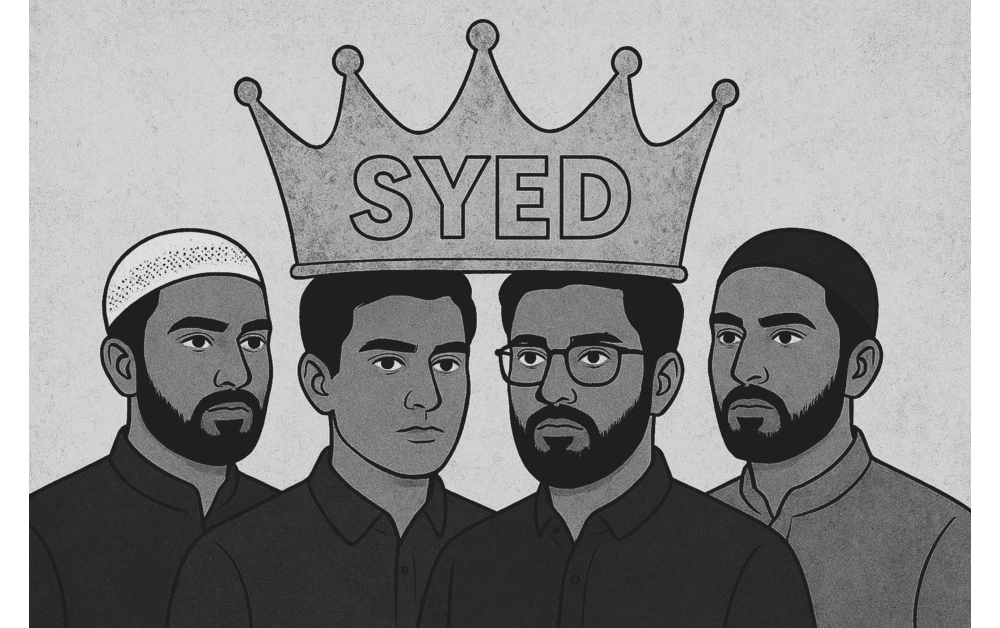
Maybe it’s time to ask: if almost everyone is “Syed,” then is anyone?
In South Asia, a name can open doors, or close them. “She’s a Syed” is often said with pride, as if it carries a divine stamp of nobility. Families boast about their “pure lineage,” matchmakers seek “only Syeds” for marriage, and those outside the circle are quietly made to feel lesser. It’s one of those cultural absurdities we’ve dressed up in religious language, forgetting that it’s the very opposite of what Islam stands for. Because, let’s be honest, this obsession with Syed privilege is nothing short of a caste system, one the Prophet ﷺ spent his entire life dismantling.
The Prophet Muhammad ﷺ came to abolish hierarchies of birth, tribe, and blood. In his Farewell Sermon, he said:
“O people! Your Lord is One. There is no superiority of an Arab over a non-Arab, nor of a non-Arab over an Arab, nor of a white over a black, nor of a black over a white, except by piety (taqwa).”
(Sunan al-Bayhaqi, Musnad Ahmad)
Islam flattened the social pyramid. It made a Bilal (RA), a formerly enslaved Black man, stand shoulder-to-shoulder with Abu Bakr (RA). It made virtue, not blood, the only measure of worth. And yet, centuries later, we built our own pyramid again, this time with “Syed” perched right at the top.
The irony is painful. The Prophet ﷺ, whose bloodline we claim to honour, never allowed lineage to be a source of pride. He warned:
“Whoever is slowed by his deeds will not be hastened by his lineage.”
(Sahih Muslim 2699)
And yet today, lineage has become an idol. We wear the Syed title like a crown, expecting reverence simply for being born into a particular family, as though faith, character, and humility are secondary. Some even use it to justify exclusion: “a Syed girl can’t marry a non-Syed,” “a Syed deserves special respect,” “descendants of the Prophet ﷺ are spiritually superior.” Really? When the Prophet ﷺ himself married women and gave his daughters in marriage across tribes, dismantling the very walls we’re rebuilding?
It’s almost comical, and deeply hypocritical, that the same society which insists lineage is carried only through men now boasts about “Syed girls” tracing their honour to the Prophet ﷺ. We’re told women cannot carry lineage. We’re told a woman becomes “someone else’s family” the day she marries. And yet, the Prophet’s entire lineage continued through his daughters, Sayyidah Fatimah (RA) and her sons, Hasan (RA) and Husayn (RA). So which one is it? If lineage can only be passed through men, then by our own flawed logic, the Prophet’s line should have ended with him. But if his bloodline did continue, and we claim to descend from him, then we must admit that the very logic we use to suppress women collapses under its own hypocrisy.
And here’s the part no one wants to hear: most people claiming to be Syed today aren’t even Syed. Research after research, including genetic studies done in Pakistan and India, has shown that the vast majority of people who call themselves Syed have no actual blood connection to the Prophet ﷺ. Scientists looked at the DNA of men from so-called “Syed families” and found that their lineages are all over the place, from South Asian to Central Asian origins, not one consistent Arab line that could trace back to the Prophet ﷺ.
In plain words: if all Syeds were truly descendants of the Prophet ﷺ, their DNA would show a clear link to a single Arab ancestor. It doesn’t. The data shows they’re just as genetically diverse as everyone else around them. Over the centuries, people adopted the Syed title for social prestige, power, or religious authority, and the label stuck. So statistically, the chances that you are actually from the Prophet’s bloodline are close to zero.
Which makes this entire caste system even more ridiculous. You’re not just acting superior for something Islam condemns, you’re acting superior over something that probably isn’t even true. A myth passed down and polished for generations, so polished that we forgot to question it.
The irony couldn’t be louder. The Prophet ﷺ never once used his lineage for status. But here we are, fourteen centuries later, clinging to a title most of us inherited not through blood, but through ego.
Our pride in the Syed label exposes a deeper cultural illness, the worship of hierarchy. We’ve created our own caste system under Islamic vocabulary, mirroring the very Hindu structures our ancestors once opposed. We mocked Brahmins for their arrogance, yet we’ve made “Syed” our version of it, a mark of purity, prestige, and untouchable status. It’s not reverence; it’s ego wrapped in religion. The Prophet ﷺ’s descendants were never meant to be a privileged class. If anything, they were meant to embody more humility, not demand more respect.
True honour in Islam has nothing to do with birth. It lies in deeds, humility, and God-consciousness.
“Indeed, the most noble of you in the sight of Allah is the most righteous of you.”
(Qur’an 49:13)
If the Prophet ﷺ didn’t see his bloodline as a badge of superiority, why do we? If his legacy was humility, equality, and justice, why have we turned it into lineage, arrogance, and exclusion? Maybe it’s time we stop using his name to elevate ourselves, and start living by his example instead.


Leave a Reply